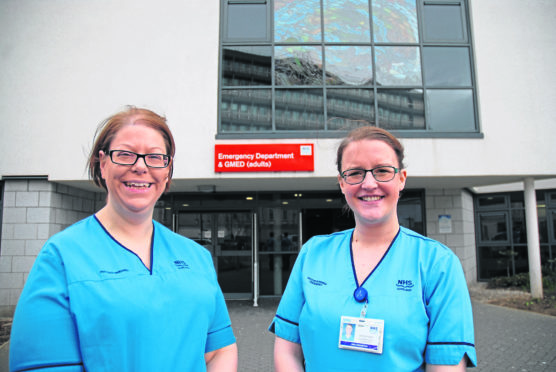Hundreds of NHS Grampian patients have been spared unnecessary hospital admissions as a result of a new project that has also saved the health board £3 million.
The three-year project has involved an occupational therapist and a physiotherapist based at Aberdeen Royal Infirmary’s emergency department, where they can assess those coming to hospital.
Their presence means patients coming into the acute facility can have their mobility assessed much more quickly than before, which leads to more patients being allowed home or to community hospitals.
The HAME (Home and Mobility Evaluation) project aims to get patients up and about as quickly as possible when they come to hospital.
“It’s all about getting people up, dressed and moving in hospital, to shorten lengths of stays but also prevent de-conditioning,” said Occupational Therapist Alicea Ross.
“Seeing them in the emergency department means they get a mobility assessment and go up to the ward with that assessment completed and there’s no real reason for them to wait for it to happen, which should reduce the length of stay.
“There’s evidence to show if they are assessed on the day of admission they go home quicker.”
“It’s of massive patient benefit.
“It’s very easy to speak about bed days and money saved but it’s also the best for the patient.
“If it was my relative I wouldn’t want them lying in a bed. I’d want them up in a chair because it is the best thing for them and that’s the most important thing.”
Since 2016, HAME has dealt with more than 2,100 patient referrals – ranging from those aged 16 to 103 – and more than 1,600 have been discharged home as a result.
Physiotherapist Susan Brown added: “The main aim was to embed physiotherapy and occupational therapy ‘at the front door’ to reduce unnecessary admissions to the acute hospital and support patient flow.
“The work helps support safe discharge from the acute setting to either home or community rehab.
“The project looks at dedicated physios and OTs in the emergency department to allow us to see more patients down there and have quicker referral to assessment times.”
Last year the team dealt with 896 referrals – up nearly 28% from 681 in 2017 – providing an estimated cost saving to the hospital of more than £1.1 million last year alone.
During that period, 97% of patients referred to the HAME project were seen within one hour.
The project is being piloted until August.
